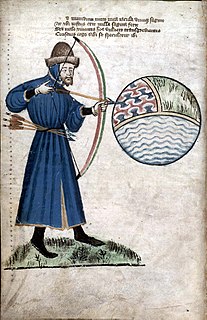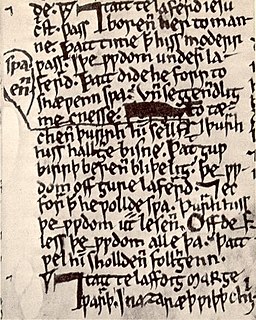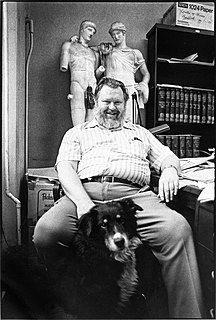Related Research Articles

Midrash is expansive Jewish Biblical exegesis using a rabbinic mode of interpretation prominent in the Talmud. The word itself means "textual interpretation", "study", or "exegesis," derived from the root verb darash (דָּרַשׁ), which means "resort to, seek, seek with care, enquire, require", forms of which appear frequently in the Hebrew Bible.
Patience is a Middle English alliterative poem written in the late 14th century. Its unknown author, designated the "Pearl Poet" or "Gawain-Poet", also appears, on the basis of dialect and stylistic evidence, to be the author of Sir Gawain and the Green Knight, Pearl, and Cleanness and may have composed St. Erkenwald. This is thought to be true because the techniques and vocabulary of regional dialect of the unknown author is that of Northwest Midlands, located between Shropshire and Lancashire.

John Gower was an English poet, a contemporary of William Langland and the Pearl Poet, and a personal friend of Geoffrey Chaucer. He is remembered primarily for three major works, the Mirour de l'Omme, Vox Clamantis, and Confessio Amantis, three long poems written in French, Latin, and English respectively, which are united by common moral and political themes.
Partial Bible translations into languages of the English people can be traced back to the late 7th century, including translations into Old and Middle English. More than 100 complete translations into English have been written.

A paraphrase is a restatement of the meaning of a text or passage using other words. The term itself is derived via Latin paraphrasis, from Ancient Greek παράφρασις (paráphrasis) 'additional manner of expression'. The act of paraphrasing is also called paraphrasis.

The Ormulum or Orrmulum is a twelfth-century work of biblical exegesis, written by a monk named Orm and consisting of just under 19,000 lines of early Middle English verse. Because of the unique phonemic orthography adopted by its author, the work preserves many details of English pronunciation existing at a time when the language was in flux after the Norman conquest of England. Consequently, it is invaluable to philologists and historical linguists in tracing the development of the language.

Kemp Malone was a prolific medievalist, etymologist, philologist, and specialist in Chaucer who was lecturer and then professor of English Literature at Johns Hopkins University from 1924 to 1956.
The Dialogue on Translation between a Lord and a Clerk, or Dialogus inter dominum et clericum, was written by John Trevisa. Along with the dedicatory Epistle, it forms the introduction to his 1387 translation of the Polychronicon of Ranulf Higden, commissioned by Trevisa's patron, Lord Berkeley. Written in Middle English, it consists of a series of arguments made by the clerk on why books should not be translated from learned languages such as Latin, each one followed by a rebuttal from the lord. The clerk eventually agrees, and the exchange concludes with a prayer for guidance in the translation.
Petrus Comestor, also called Pierre le Mangeur, was a twelfth-century French theological writer and university teacher.
The medieval popular Bible is a term used especially in literary studies, but also in art history and other disciplines, to encompass the wide variety of presentations of biblical material in medieval culture not directly recorded in the exegetical tradition.
Life of Soul is a short anonymous prose tract written in the late Middle English of the English Midlands about 1400 or a little earlier.

Bible translations in the Middle Ages discussions are rare in contrast to Late Antiquity, when the Bibles available to most Christians were in the local vernacular. In a process seen in many other religions, as languages changed, and in Western Europe languages with no tradition of being written down became dominant, the prevailing vernacular translations remained in place, despite gradually becoming sacred languages, incomprehensible to the majority of the population in many places. In Western Europe, the Latin Vulgate, itself originally a translation into the vernacular, was the standard text of the Bible, and full or partial translations into a vernacular language were uncommon until the Late Middle Ages and the Early Modern Period.
The Historia Scholastica is a twelfth-century Biblical paraphrase written in Medieval Latin by Petrus Comestor. Sometimes called the "Medieval Popular Bible", it draws on the Bible and other sources, including the works of classical scholars and the Fathers of the Church, to present a universal history.
A biblical paraphrase is a literary work which has as its goal, not the translation of the Bible, but rather, the rendering of the Bible into a work that retells all or part of the Bible in a manner that accords with a particular set of theological or political doctrines. Such works "weave with ease and without self-consciousness, in and out of material from the volume we know between hard covers as the Bible ...(bringing it) into play with disparate sources, religious practices, and (prayers)."
Laura Howes is an American scholar of Middle English literature. She is the author of Chaucer's Gardens and the Language of Convention (1998) and the editor, with Marie Borroff, of the Norton Critical Edition of Sir Gawain and the Green Knight (2010). Howes received her B.A. from Cornell University and her M.A. and Ph.D. from Columbia University, and is Professor of English at the University of Tennessee.
Elizabeth Solopova is a British philologist and medievalist undertaking research at New College, Oxford. She is known outside academic circles for her work on J. R. R. Tolkien's Middle-earth writings.
Alastair J. Minnis is a Northern Irish literary critic and historian of ideas who has written extensively about medieval literature, and contributed substantially to the study of late-medieval theology and philosophy. Having gained a first-class B.A. degree at the Queen's University of Belfast, he matriculated at Keble College, Oxford as a visiting graduate student, where he completed work on his Belfast Ph.D., having been mentored by M.B. Parkes and Beryl Smalley. Following appointments at the Queen's University of Belfast and Bristol University, he was appointed Professor of Medieval Literature at the University of York; also Director of the Centre for Medieval Studies and later Head of English & Related Literature. From 2003 to 2006, he was a Humanities Distinguished Professor at Ohio State University, Columbus, from where he moved to Yale University. In 2008, he was named Douglas Tracy Smith Professor of English at Yale. He retired in 2018, and is now living in the Scottish Borders. Professor Minnis is a Fellow of the English Association, UK (2000), a Fellow of the Medieval Academy of America (2001), and an Honorary Member of the Royal Irish Academy (2016). From 2012 to 2014, he served as President of the New Chaucer Society. Currently, he is Vice-President of the John Gower Society. He was General Editor of the Cambridge University Press series Cambridge Studies in Medieval Literature from 1987 to 2018, and holds an honorary master's degree from Yale (2007) and an honorary doctorate from the University of York (2018). The University of York also bestowed on him the honorific title of Emeritus Professor of Medieval Literature (2018).

Robert Earl Kaske was an American professor of medieval literature. He spent most of his career at Cornell University in Ithaca, New York, where he was the Avalon Foundation Professor in the Humanities, and where he founded one of the preeminent medieval studies graduate programs in North America. His published output included lengthy interpretations of Beowulf and of poems and passages by Dante and Chaucer, and frequently constituted leading studies. Kaske particularly enjoyed solving cruxes, with articles on problematic passages in works such as Pearl, Piers Plowman, the Divine Comedy, The Husband's Message, The Descent into Hell, and Beowulf.
Constance Bartlett Hieatt was an American scholar with a broad interest in medieval languages and literatures, including Old Norse literature, Anglo-Saxon prosody and literature, and Middle English language, literature, and culture. She was an editor and translator of Karlamagnús saga, of Beowulf, and a scholar of Geoffrey Chaucer. She was particularly known as one of the world's foremost experts in English medieval cooking and cookbooks, and authored and co-authored a number of important books considered essential publications in the field.
Thorlac Francis Samuel Turville-Petre is an English philologist who is Professor Emeritus and former head of the School of English at the University of Nottingham. He specializes in the study of Middle English literature.
References
- ↑ "James H. Morey, Professor". english.emory.edu. Archived from the original on 2015-06-14.
- ↑ "James H. Morey, Professor". english.emory.edu. Archived from the original on 2015-06-14.
- ↑ Thomas H. Bestul, "Book and Verse." Speculum, Vol. 77, No. 2 (Apr., 2002), pp. 608-610.
- ↑ Richard K. Emmerson "A Guide to Middle English Biblical Literature," The Journal of English and Germanic Philology, Vol. 100, No. 4 (Oct., 2001), pp. 574-575.
- ↑ Sue Powell, Book and Verse: A Guide to Middle English Biblical Literature, The Modern Language Review, Vol. 98, No. 2 (Apr., 2003), pp. 418-420.
- ↑ Jameela Lares, "Book and Verse," Church History, Vol. 71, No. 3 (Sep., 2002), p. 651,
- ↑ Approaching medieval English anchoritic and mystical texts Christianity and culture, Dee Dyas, Valerie Edden, Roger Ellis, DS Brewer, 2005, p. 48.